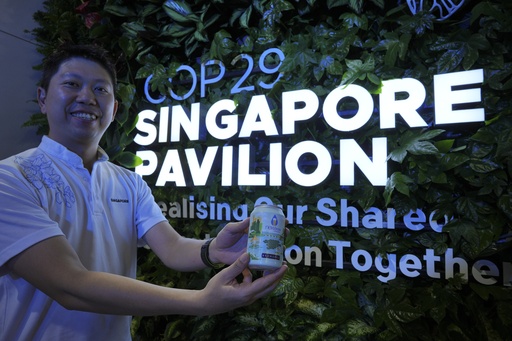
BAKU, Azerbaijan — At the ongoing United Nations climate talks, an eye-catching display in the pavilion area showcases a unique beverage option: beer cans in aqua and purple shades that draw attention from attendees. These cans contain a product called NEWBrew, which is provided free of charge to anyone interested. However, many are taken by surprise to learn that this beer is produced using treated wastewater.
“I had no idea. I was quite astonished,” said Ignace Urchil Lokouako Mbouamboua, an international relations student from Congo, who sampled the brew during a break. He enthusiastically suggested more production of this type of beer after admitting it was his third consecutive day visiting the counter for a can.
NEWBrew is crafted in Singapore using NEWater, a term that refers to the nation’s treated wastewater. This initiative is part of a broader campaign aimed at preserving water resources in a region facing significant challenges related to water scarcity. Dubbed “sewage beer” by some people at the conference, it is one of several innovative solutions addressing climate and environmental issues on display at COP29 in Azerbaijan, emphasizing the urgent need to secure drinking water as the population continues to rise.
Singapore has long been recognized as a pioneer in effective water management strategies. Located in Southeast Asia, this island state, home to 6 million individuals, has no natural water sources. Alongside importing water from Malaysia, Singapore’s water strategy heavily relies on capturing rainwater, desalination, and recycling processes. Officials anticipate that water demand will double by 2065, necessitating an increase in all available water sources.
Although the concept of consuming treated wastewater may be novel to some conference attendees, Singaporeans are well accustomed to it. The country has launched national campaigns for decades promoting water conservation and showcasing the recycling process. A famous moment occurred in 2022 when then-Prime Minister Goh Chok Tong was photographed drinking NEWater after a tennis match to help normalize the practice.
Ong Tze-Ch’in, the chief executive of Singapore’s Public Utility Board, shared that NEWBrew was first created by a local brewery in 2018 for the International Water Week. It was produced again in 2022 and is being featured once more this year. “This is all about enhancing the acceptance of recycled water, which can often be a challenging topic,” Ong remarked. He also mentioned that he was involved in the collaborative efforts for this year’s brew, which is a “modern pilsner” variety, and joked about the subjective nature of beer preferences.
Peter Rummel, Bentley Systems’ director for infrastructure policy advancement, attended a panel discussion on water management and subsequently tried a can of NEWBrew. As a resident of Munich, Germany—a city renowned for its Oktoberfest beer festival—he assessed the beverage critically. “It’s fresh, light, cool. It has a nice flavor,” Rummel stated while examining the can.
The local brewery, The Brewerkz Group, has produced approximately 5,000 liters, equating to about 15,000 cans for each NEWBrew release. Managing director Wee-Tuck Tan noted that the brewing process is consistent with traditional beer-making, pricing them around 7 Singaporean dollars (approximately $5 U.S.) per can in stores. He believes that introducing beer has positively impacted public perceptions of NEWater. “Some think it has an odd taste, but when it’s presented in beer form, it alters their perception. Most people can’t even tell the difference,” he explained.
Water scarcity is an increasing global concern, and the acceptance of treated wastewater as a viable solution is noticeably growing, according to Saroj Kumar Jha, who is the director of the global water department at the World Bank Group. At the Singapore pavilion’s water management panel, he shared experiences from his travels across over 50 countries in the last two years, revealing that officials often prefer to call it “used water” instead of “wastewater.”
After the panel discussion, Jha and fellow speakers raised their NEWBrews in a toast. “It’s genuinely good,” he said. “This is my fourth time enjoying it this year—though not today,” he added with a chuckle.
